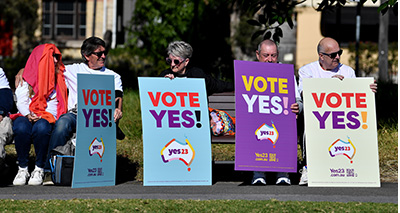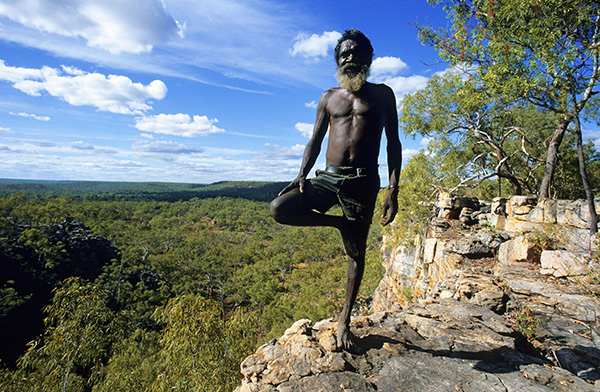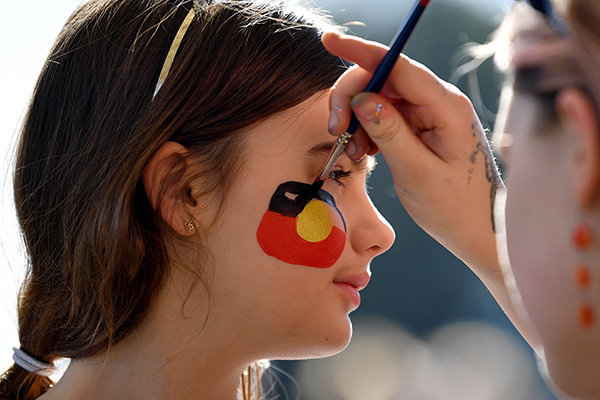Could Australia Vote to Abolish Itself?
Gregory Hood, American Renaissance, July 21, 2023

Subscribe to future audio versions of AmRen articles here.
Credit Image: © Bianca De Marchi/EFE via ZUMA Press
The Australian people will vote on a referendum before the end of the year. The text is simple enough: “A Proposed Law: to alter the Constitution to recognise the First Peoples of Australia by establishing an Aboriginal and Torres Strait Islander Voice. Do you approve this proposed alteration?”
The “Voice” would be an Aboriginal government body that could make “representations to the Parliament and the Executive Government of the Commonwealth on matters relating to Aboriginal and Torres Strait Islander peoples.” Would it have power? No. Could it force through legislation? No. Could it even challenge Parliament? Not really.
It’s the proponents of the referendum who assure us that it will be powerless, and that Parliament will retain the ability to make laws. The Guardian says that “a majority of leading constitutional lawyers have all either spoken strongly in favour of the voice or rebuffed concerns about the legal effect of its representations.”
Nonetheless, what’s at stake is nothing less than Australia itself.
The “Yes” and “No” camps recently released their official positions. The “No” camp argues that the “Voice” could cause big legal problems for Australia and divide the country. “[T]he Voice specifically covers all areas of ‘Executive Government.’ This means no issue is beyond its reach.” Furthermore, it’s likely that the High Court, not Parliament, would determine its powers. “It risks legal challenges, delays, and dysfunctional government,” say the Nos.
According to the federal solicitor general, this is “absolute nonsense.” He says it “would not pose any threat to Australia’s system of representative and responsible government.” It would give advice and have some limited power to table certain proposals and thus delay legislation. Former prime minister Tony Abbott has compared it to the British House of Lords.
But what would it do? We don’t know because the details would be worked out after this new is body approved. “We don’t know how it will work, we don’t know who will be on it, but we do know it will permanently divide us as Australians,” claims the “No” campaign. “Constitutions are not places where you want to freeze details,” replies supposed “constitutional expert” Anne Twomey. “It is appropriate to leave it to parliament as this gives greater flexibility to adjust for future needs.” Political bodies always want more power. That’s why constitutions set limits.
The official support pamphlet for the Voice claims that it will “deliver real improvements for Aboriginal and Torres Straight Islander people in life expectancy, infant mortality and health, and education and employment.” How will it perform such miracles without power? The government is already trying to improve life for Aboriginals. According to the official “Closing The Gap” report in 2020, “achieving equality in life expectancy and closing the gap in life expectancy within a generation is not on track to be met by 2031,” and “progress against Closing The Gap targets has been mixed over the past decade.” Campaigners vaguely promise that the Voice means the government will “[listen] to the people on the ground.” Has no one ever heard from them before?

Australia – Northern Territory, Arnhem Land (Credit Image: © Hughes Herv/Hemis/ZUMAPRESS.com)
Besides, which people? Who will speak for the “Voice”? We don’t know that either. We just know that it will “include Indigenous Australians from every state and territory, from the Torres Strait Islands and representatives from the regions and remote communities.” There will be a balance of men and women and there will be young people.
“Other nations with similar histories, like Canada and New Zealand, formally recognised their own First Peoples decades ago,” says the Yes campaign pamphlet. “Experience shows there is nothing to fear — and so much to gain.” This is true for people who make a living guilt-tripping whites and inventing new mythologies to justify taking their money. However, if the goal is “reconciliation” and “forging a greater sense of unity,” as the Yes campaign claims, those things are farther away than ever.
According to a 2021 poll, fewer Canadians describe race relations as “good” compared to 2019, not least because new injustices have been “discovered” at now-long-closed boarding schools for Indian children. New Zealand has its own “Voice” to Parliament. The overwhelming majority of New Zealanders believe the country has become more divided in recent years, with just 16 percent saying it had become more unified. Even the name of the country is in question, with some demanding it be called “Aotearoa.”
Some No campaigners argue that the Voice is obviously the first step to reparations and other radical changes, while Yes campaigners say Parliament will retain all authority. Again, this raises the question of why they are fighting for a body that can’t do anything.
The Minister for Indigenous Australians says the Voice is only a way to represent Aboriginal views and work to achieve equitable outcomes:
It’s about drawing a line on the poor outcomes from the long legacy of failed programs and broken policies, and listening to Aboriginal and Torres Strait Islander people. Things like incarceration and child removal. Housing, health and educational outcomes. This voice is about making sure that what happens in the federal parliament is going to be a positive step forward both in terms of us as a nation, but also the life outcomes for First Nations people in Australia.
Isn’t this what a Minister for Indigenous Australians is for? Isn’t this something Parliament is supposed to do? In a democracy, the people get to vote and the citizens are sovereign. It’s a sharp break with democracy if members of a certain ethnic group get their own ethnically-based Parliament that “represents” their views. And what happens to Aboriginals who don’t want to be part of this?
NGOs, human rights courts, international organizations, race lobbies, and other groups have a great deal of influence over policy in many Western countries. Civil rights, anti-racism, and equality programs spawned a giant regulatory state, with bureaucrats, activists, academics, and reporters working together to invent new grievances and demands. The system is a vast patronage network that applies pressure on whites. The mutation of well-meaning Australian efforts to acknowledge Aboriginal history into “Land Acknowledgements” challenges the very presence of whites in the country they built. Symbolic fine talk, like the Voice, swiftly expands into demands for land, money, and power.
It’s easy to predict what a Voice will do. It will be a permanent political base for Indigenous activists to complain about inequalities. These inequalities are biological and therefore permanent, so there will be ever more ambitious “solutions” proposed in defiance of reality, with symbolic gestures and “official advice” turning into accusations that white Australians have no right to be there. The Voice will have constitutional status, so the least damaging outcome will be a state-recognized ethnic lobby that can never be eliminated. The worst outcome would be that Parliament and the High Court gradually give it powers that naïve “Yes” voters never imagined, just as American civil rights law ultimately overwhelmed foundational constitutional protections.

A girl has the Aboriginal flag painted on her face during a ‘Yes23’ event in support of an Indigenous Voice to Parliament, in Sydney, New South Wales on July 2, 2023. (Credit Image: © Bianca De Marchi/EFE via ZUMA Press)
Some voters seem to sense this. Support for the Voice is declining. Women are more likely than men to vote “no.” In response, the Labour government is considering scrapping the referendum and rolling out “regional” Voice bodies to show how they would work. The point would be to enshrine powerful lobbies at the regional level rather than risk an embarrassing national defeat. The vote on the Voice is like Brexit: a once-in-a-lifetime chance for the people in a Western democracy to vote on something that matters. When they do, their rulers usually regret it. Prime Minister Anthony Albanese is supposedly still committed to the referendum, but he’ll pay a price if it fails. He could suffer the same political death as British Prime Minister David Cameron after Brexit.
Defeating the referendum would be a victory, but it’s just a defensive measure. Already, many seem to believe that Indigenous Australians should have special status. Will whites get their own Parliament? Of course not. This is modern democracy; majority rule has been sacrificed to racial nationalism for everyone but whites. John Calhoun’s concept of the “Concurrent Majority,” in which powerful blocs get a kind of veto power over the general government, is more popular than ever, except that whites are left out. We are not supposed to have legitimate interests of any kind.
In the United States, the 1619 Project argues that the true Founding dates from slavery and the struggle for black emancipation is what defines the country. In Canada, it’s the “First Nations” who are true Canadians and the residential boarding schools are Canada’s monuments of shame. In the United Kingdom, thousands of years of history mean almost nothing, because true history begins with the “Windrush Generation,” and Stephen Lawrence is now a national hero. In Britain, Ireland, Germany, and other white countries, white historical figures become villains.
You could argue that Aborigines — just four percent of the population — will never be more than an annoying charity case. But once you remove whites’ claim to national ownership, all forms of dispossession become possible. Australia should have kept the White Australia policy. In every white country, “colorblind” civic identity is a cruel fantasy. The choice has always been white identity or white subjugation, pride or shame, permanence or decay.
Simple language can bring colossal change. The 1991 referendum that ended white rule in South Africa said only this: “Do you support continuation of the reform process which the State President began on 2 February 1990 and which is aimed at a new Constitution through negotiation?”
At least Australians will get to vote. Let’s hope they make the right choice.















